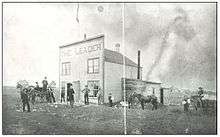Nicholas Flood Davin
| Nicholas Flood Davin | |
|---|---|
 | |
| Member of the Canadian Parliament for Assiniboia West | |
|
In office 1887–1900 | |
| Preceded by | Electoral district created |
| Succeeded by | Thomas Walter Scott |
| Personal details | |
| Born |
January 13, 1840 Kilfinane (Republic of Ireland) |
| Died |
October 18, 1901 (aged 61) Winnipeg, Manitoba |
| Political party | Liberal-Conservative |
Nicholas Flood Davin (January 13, 1840 – October 18, 1901) Nicholas Flood Davin was a lawyer, journalist and politician, born at Kilfinane, Ireland.[1] The first MP for Assiniboia West (1887–1900), Davin was known as the voice of the North-West.
A spellbinding speaker, Davin founded and edited the Regina Leader, the first newspaper in Assiniboia. He tried to gain provincial status for the territory. Davin produced the Report on Industrial Schools for Indians and Half-Breeds, otherwise known as The Davin Report, in which he advised the federal government to institute residential schools for native youth; a recommendation that decimated Canadian Aboriginal families.
Life
Early life
Davin was a parliamentary and war correspondent in England before arriving in Toronto in 1872, where he wrote for The Globe. Although a fully qualified lawyer, Davin practised little law. The highlight of his legal career was his 1880 defence of George Bennett, who murdered George Brown.
Move West

A chance visit to the West in 1882 determined his future. In 1883, he founded and edited the Regina Leader, the first newspaper in Assiniboia; the paper carried his detailed reports of the 1885 trial of Louis Riel. A spellbinding speaker and Conservative MP for Assiniboia West from 1887–1900, Davin tried to gain provincial status for the territory, economic and property advantages for the new settlers–even the franchise for women–but he never achieved his ambition to be a Cabinet minister. A mercurial personality, he became depressed by the decline of his political and personal fortunes and shot himself during a visit to Winnipeg on October 18, 1901. Davin wrote The Irishman in Canada (1877), as well as poetry, and an unpublished novel.
Authorship
Davin used, among others, the literary device of inter-textuality to draw upon British canonical writers including Tennyson, Byron, and Shakespeare to connect the associations of empire with his 19th-century audience. In 1876, Davin wrote an adaptation of Shakespeare The Fair Grit; or The Advantages of Coalition. A Farce, an adaptation of Shakespeare’s Romeo and Juliet. The play is a farce on governmental coalitions and the corrupted role of media in Canadian politics – a power fully realized by Davin as a writer and founder of the Regina Leader newspaper located in Canada’s North-West.
Three years later, Davin produced the Report on Industrial Schools for Indians and Half-Breeds, otherwise known as The Davin Report (1879), in which he advised John A. Macdonald’s federal government to institute residential schools for Indigenous youth; a recommendation that decimated Canadian Aboriginal families. In 1884, while visiting Ottawa, Davin wrote Eos – A Prairie Dream (1884), a collection of poems that, in his own words, "strike a true and high note in Canadian politics and literature" (5) while he represents, through his poetry, the destruction of Aboriginal culture (Moll, "The Davin Report: Shakespeare and Canada's Manifest Destiny," Canadian Adaptations of Shakespeare Project, par 2).
Gunhilda Letters
Nicholas Flood Davin complimented the 'Gunhilda letters' "for felicity of expression, cogency of reasoning, fierceness of invective, keenness of satire and piquancy of style" and "Nothing equal to them has appeared in the Canadian press for years." [2] In 1881, Susan Anna Wiggins used the nom de plume 'Gunhilda' to write the Gunhilda Letters--Marriage with a Deceased Husband's Sister: Letters of a Lady to [John Travers Lewis], the Right Rev. the Lord Bishop of Ontario, which consisted of letters of support for Mr. Girouard's bill regarding the legalization of marriage with a deceased wife's sister, long-time prohibited by British law at home and overseas. The Gunhilda Letters were dedicated to the members of the Senate of Canada and of the House of Commons of Canada who supported Mr. Girouard's Bill.[3]
External links
- http://www.findagrave.com/cgi-bin/fg.cgi?page=gr&GRid=1114978
- Biography at the Dictionary of Canadian Biography Online
- Canadian Shakespeares
- the Canadian Encyclopedia
- Nicholas Flood Davin – Parliament of Canada biography
References
- ↑ John Herd Thompson(1994). "Davin, Nicholas Flood". University of Toronto/Université Laval. Retrieved October 3, 2013.
- ↑ Types of Canadian Women who are or have been connected to Canada by Henry James Morgan Toronto William Briggs 1903
- ↑ Marriage with a deceased wife's sister : letters of a lady to the Right Rev. the Lord Bishop of Ontario.